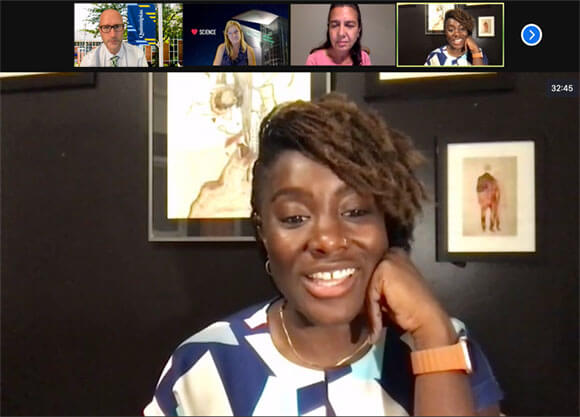
PR professionals encourage students to pursue their passions
October 04, 2021

October 04, 2021

The event had a panel of esteemed communications professionals who spoke about how their organizations handled communications — specifically public relations — throughout the coronavirus pandemic.
Quinnipiac alumna and panelist Mercy Quaye ’13, MS ’19, president of the Narrative Project and columnist at the Connecticut Mirror, said that her business worked with its mission-driven organizations throughout the pandemic to support them however possible.
“We took an approach of, ‘listen you should talk about this,’… there’s a moment in our country’s history happening right now,” said Quaye. “You should consider ‘x, y and z,’ and for your stakeholder group, you should consider ‘x, y and z.’ And we really personalized each recommendation for each of our partners.”
Daryl Richard, vice president of marketing and communications at Quinnipiac, discussed the benefits of working with smaller organizations in his previous job at United Healthcare.
“We had the option we could work with one large global PR firm if we wanted, but instead we actually worked with 38 different local market boutique PR firms for a reason,” Richard said. “And people in procurement thought I was crazy, and I said, ‘No, you have a much better relationship, you have a much more personalized nature of the work together.’”
Richard went on to discuss working in crisis communication, specifically reflecting on the steps he went through during the coronavirus pandemic to keep the university community informed.
When talking about his “crisis playbook,” Richard reflected on all of the steps that he and his team had to stay on top of.
“We had to figure out what the right frequency was to keep our students, faculty, staff updated with information that was pertinent to them,” said Richard.
Quaye also touched on the Narrative Project’s guide, referred to as the narrative checklist. She explained the importance of being rooted in the truth as a public relations professional.
“Before embarking on any comms effort, before launching any campaign, we go through this checklist and at the top of it is just the question, ‘Is this true,’” she said.
Debbie Horne, director of communications and marketing at Special Olympics Connecticut said that “to be honest is the most important thing.”
Horne said that, especially when working with individuals with differing intellectual and physical abilities, it is important to have open, honest and clear communication to convey your message.
Before the Q&A opened for students, the panelists offered advice to the Bobcats looking to intern or work in the marketing and public relations sphere.
Horne implored students to “explore what you like to do!”
Horne specifically encouraged students to volunteer to gain experience in different areas while also contributing to organizations, such as Special Olympics, that depend on their volunteers.
“It’s a great way to network with people, it’s a great way to get real-world experience, talk to different people, get to know different people, see if it’s something you’re interested in,” Horne reiterated. “You might surprise yourself and you might be really happy when you come to where you’re supposed to be!”
Before moving onto student questions, panelist Tracy Shirer, vice president of marketing and communications at the Connecticut Science Center advised students to “think about the industries that have stories to tell, that can make impact whether it’s in the public sector or the private sector or nonprofit. Those skills all translate…all of those skills help each other.”
Quinnipiac Today is your source for what's happening throughout #BobcatNation. Sign up for our weekly email newsletter to be among the first to know about news, events and members of our Bobcat family who are making a positive difference in our world.
Sign Up Now